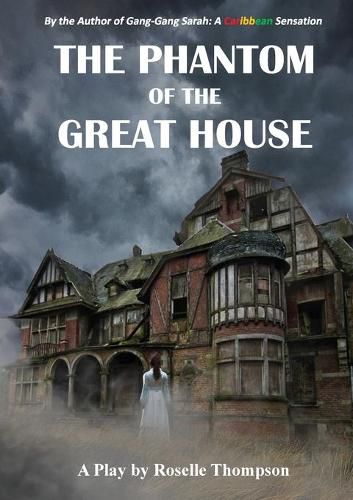Readings Newsletter
Become a Readings Member to make your shopping experience even easier.
Sign in or sign up for free!
You’re not far away from qualifying for FREE standard shipping within Australia
You’ve qualified for FREE standard shipping within Australia
The cart is loading…






This title is printed to order. This book may have been self-published. If so, we cannot guarantee the quality of the content. In the main most books will have gone through the editing process however some may not. We therefore suggest that you be aware of this before ordering this book. If in doubt check either the author or publisher’s details as we are unable to accept any returns unless they are faulty. Please contact us if you have any questions.
The Phantom of the Great House is a Gothic play, set in Grenada, with a sub-genre categorised as a psychological thriller. Based on the iconic Great House in the Caribbean, the story combines elements of horror, romance, mystery, seduction, murder, suspense, debauchery, lust, obeah, brutality, zombies, love/lust, treachery, the role of the incubus, madness, the morally corrupt white Planter, and the Great House, as a haunted space. Psychic fear is explored from different perspectives: as the subliminal horrors and dangers of the Caribbean physical landscape; the history of the island that haunts its people; operating socially and culturally as a belief system, and as real haunting, by those who witness the horrific events in the Great House.
Thompson’s writing, whether Novel, Short stories, Poetry or Plays, continue to address the liminal status of the Caribbean in a post-colonial, post-modernist context. In this Play, she explores the complexities of the colonial legacy; presenting the epistemological effects of colonization that inform her work. Identifying as a Caribbean writer, Roselle Thompson uses her art to delve into some of the deep colonial damage on the psyche of the people, their cultural heritages, and their resultant discourse and thinking. Therefore, this play’s themes include the colonial burden on succeeding generations, fragmentation of Caribbean identity, and the role of the Caribbean Writer, in a post-colonial epoch; as being instrumental in either directing or redirecting society.
$9.00 standard shipping within Australia
FREE standard shipping within Australia for orders over $100.00
Express & International shipping calculated at checkout
This title is printed to order. This book may have been self-published. If so, we cannot guarantee the quality of the content. In the main most books will have gone through the editing process however some may not. We therefore suggest that you be aware of this before ordering this book. If in doubt check either the author or publisher’s details as we are unable to accept any returns unless they are faulty. Please contact us if you have any questions.
The Phantom of the Great House is a Gothic play, set in Grenada, with a sub-genre categorised as a psychological thriller. Based on the iconic Great House in the Caribbean, the story combines elements of horror, romance, mystery, seduction, murder, suspense, debauchery, lust, obeah, brutality, zombies, love/lust, treachery, the role of the incubus, madness, the morally corrupt white Planter, and the Great House, as a haunted space. Psychic fear is explored from different perspectives: as the subliminal horrors and dangers of the Caribbean physical landscape; the history of the island that haunts its people; operating socially and culturally as a belief system, and as real haunting, by those who witness the horrific events in the Great House.
Thompson’s writing, whether Novel, Short stories, Poetry or Plays, continue to address the liminal status of the Caribbean in a post-colonial, post-modernist context. In this Play, she explores the complexities of the colonial legacy; presenting the epistemological effects of colonization that inform her work. Identifying as a Caribbean writer, Roselle Thompson uses her art to delve into some of the deep colonial damage on the psyche of the people, their cultural heritages, and their resultant discourse and thinking. Therefore, this play’s themes include the colonial burden on succeeding generations, fragmentation of Caribbean identity, and the role of the Caribbean Writer, in a post-colonial epoch; as being instrumental in either directing or redirecting society.